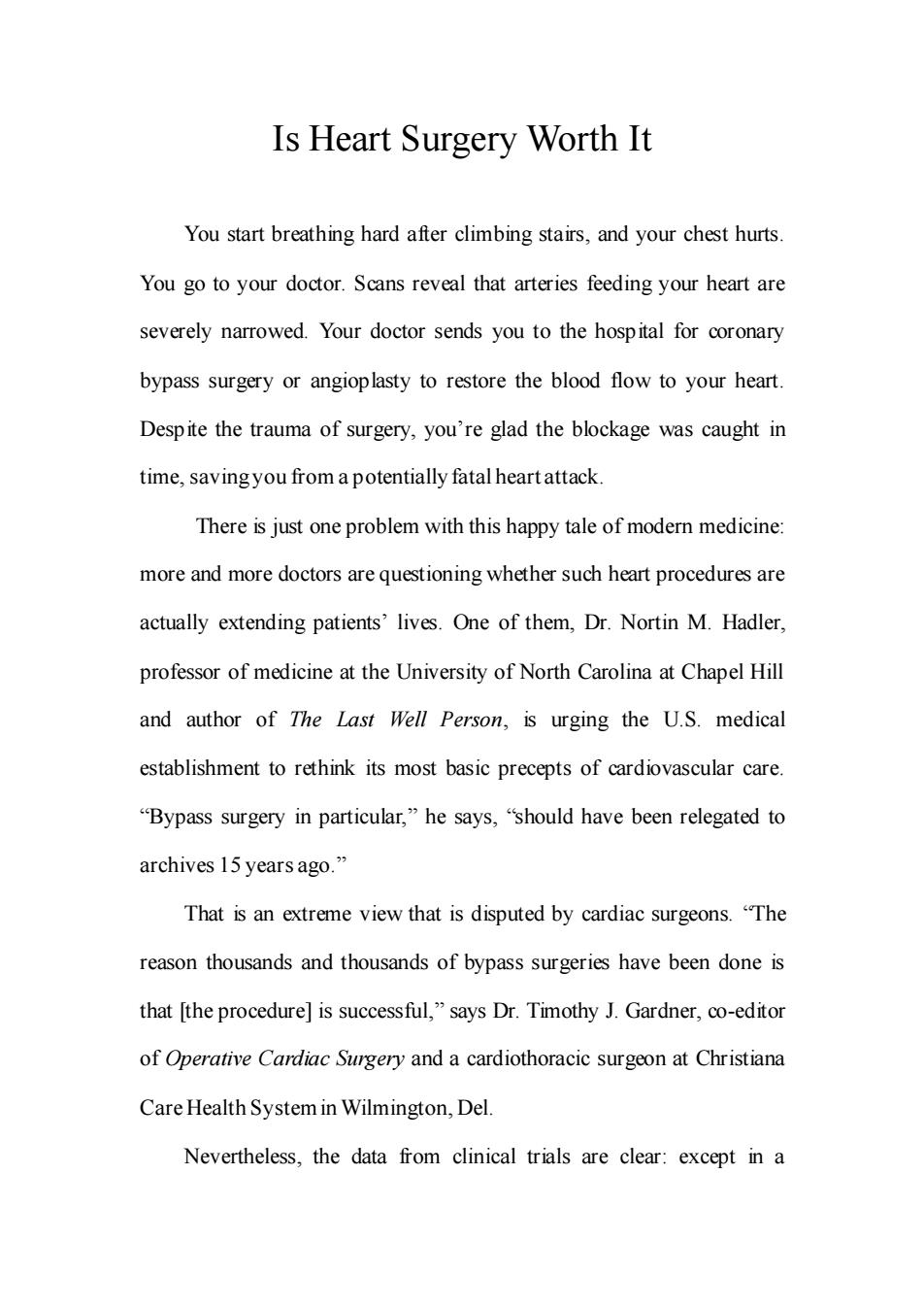
Is Heart Surgery Worth It You start breathing hard after climbing stairs,and your chest hurts. You go to your doctor.Scans reveal that arteries feeding your heart are severely narrowed.Your doctor sends you to the hospital for coronary bypass surgery or angioplasty to restore the blood flow to your heart. Despite the trauma of surgery,you're glad the blockage was caught in time,saving you from a potentially fatal heart attack. There is just one problem with this happy tale of modern medicine more and more doctors are questioning whether such heart procedures are actually extending patients'lives.One of them,Dr.Nortin M.Hadler, professor of medicine at the University of North Carolina at Chapel Hill and author of The Last Well Person,is urging the U.S.medical establishment to rethink its most basic precepts of cardiovascular care. "Bypass surgery in particular,"he says,should have been relegated to archives 15 years ago." That is an extreme view that is disputed by cardiac surgeons.The reason thousands and thousands of bypass surgeries have been done is that [the procedure]is successful,"says Dr.Timothy J.Gardner,co-editor of Operative Cardiac Surgery and a cardiothoracic surgeon at Christiana Care Health System in Wilmington,Del. Nevertheless,the data from clinical trials are clear:except in a
Is Heart Surgery Worth It You start breathing hard after climbing stairs, and your chest hurts. You go to your doctor. Scans reveal that arteries feeding your heart are severely narrowed. Your doctor sends you to the hospital for coronary bypass surgery or angioplasty to restore the blood flow to your heart. Despite the trauma of surgery, you’re glad the blockage was caught in time, saving you from a potentially fatal heart attack. There is just one problem with this happy tale of modern medicine: more and more doctors are questioning whether such heart procedures are actually extending patients’ lives. One of them, Dr. Nortin M. Hadler, professor of medicine at the University of North Carolina at Chapel Hill and author of The Last Well Person, is urging the U.S. medical establishment to rethink its most basic precepts of cardiovascular care. “Bypass surgery in particular,” he says, “should have been relegated to archives 15 years ago.” That is an extreme view that is disputed by cardiac surgeons. “The reason thousands and thousands of bypass surgeries have been done is that [the procedure] is successful,” says Dr. Timothy J. Gardner, co-editor of Operative Cardiac Surgery and a cardiothoracic surgeon at Christiana Care Health System in Wilmington, Del. Nevertheless, the data from clinical trials are clear: except in a
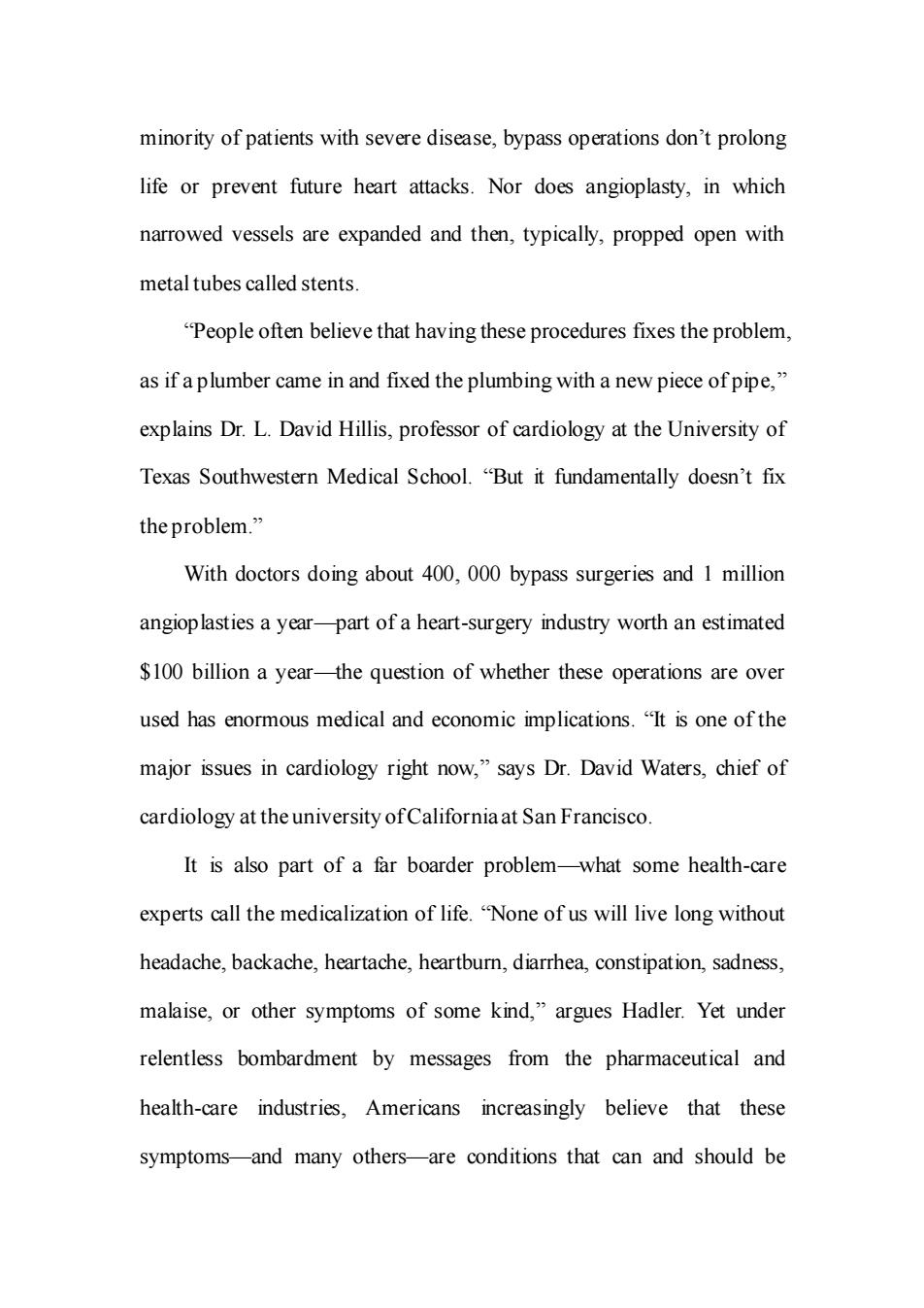
minority of patients with severe disease,bypass operations don't prolong life or prevent future heart attacks.Nor does angioplasty,in which narrowed vessels are expanded and then,typically,propped open with metal tubes called stents. "People often believe that having these procedures fixes the problem, as if a plumber came in and fixed the plumbing with a new piece of pipe," explains Dr.L.David Hillis,professor of cardiology at the University of Texas Southwestern Medical School."But it fundamentally doesn't fix the problem. With doctors doing about 400,000 bypass surgeries and 1 million angioplasties a year-part of a heart-surgery industry worth an estimated $100 billion a year-the question of whether these operations are over used has enormous medical and economic implications."It is one of the major issues in cardiology right now,"says Dr.David Waters,chief of cardiology at the university of Californiaat San Francisco It is also part of a far boarder problem-what some health-care experts call the medicalization of life."None of us will live long without headache,backache,heartache,heartburn,diarrhea,constipation,sadness, malaise,or other symptoms of some kind,"argues Hadler.Yet under relentless bombardment by messages from the pharmaceutical and health-care industries,Americans increasingly believe that these symptoms-and many others-are conditions that can and should be
minority of patients with severe disease, bypass operations don’t prolong life or prevent future heart attacks. Nor does angioplasty, in which narrowed vessels are expanded and then, typically, propped open with metal tubes called stents. “People often believe that having these procedures fixes the problem, as if a plumber came in and fixed the plumbing with a new piece of pipe,” explains Dr. L. David Hillis, professor of cardiology at the University of Texas Southwestern Medical School. “But it fundamentally doesn’t fix the problem.” With doctors doing about 400, 000 bypass surgeries and 1 million angioplasties a year—part of a heart-surgery industry worth an estimated $100 billion a year—the question of whether these operations are over used has enormous medical and economic implications. “It is one of the major issues in cardiology right now,” says Dr. David Waters, chief of cardiology at the university of California at San Francisco. It is also part of a far boarder problem—what some health-care experts call the medicalization of life. “None of us will live long without headache, backache, heartache, heartburn, diarrhea, constipation, sadness, malaise, or other symptoms of some kind,” argues Hadler. Yet under relentless bombardment by messages from the pharmaceutical and health-care industries, Americans increasingly believe that these symptoms—and many others—are conditions that can and should be
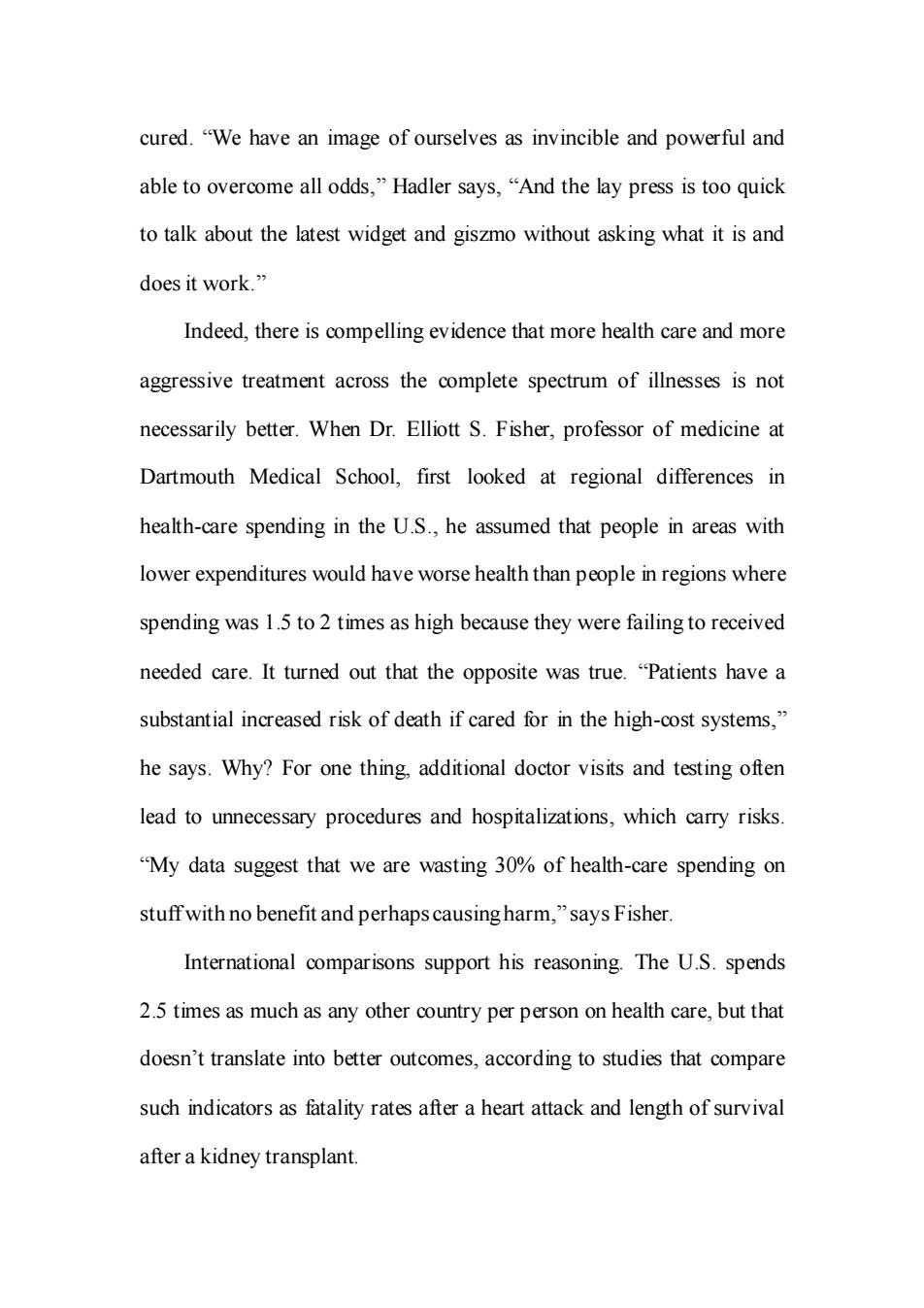
cured."We have an image of ourselves as invincible and powerful and able to overcome all odds,"Hadler says,"And the lay press is too quick to talk about the latest widget and giszmo without asking what it is and does it work.” Indeed,there is compelling evidence that more health care and more aggressive treatment across the complete spectrum of illnesses is not necessarily better.When Dr.Elliott S.Fisher,professor of medicine at Dartmouth Medical School,first looked at regional differences in health-care spending in the U.S.,he assumed that people in areas with lower expenditures would have worse health than people in regions where spending was 1.5 to 2 times as high because they were failing to received needed care.It turned out that the opposite was true."Patients have a substantial increased risk of death if cared for in the high-cost systems," he says.Why?For one thing,additional doctor visits and testing often lead to unnecessary procedures and hospitalizations,which carry risks "My data suggest that we are wasting 30%of health-care spending on stuff with no benefit and perhaps causing harm,"says Fisher. International comparisons support his reasoning.The U.S.spends 2.5 times as much as any other country per person on health care,but that doesn't translate into better outcomes,according to studies that compare such indicators as fatality rates after a heart attack and length of survival after a kidney transplant
cured. “We have an image of ourselves as invincible and powerful and able to overcome all odds,” Hadler says, “And the lay press is too quick to talk about the latest widget and giszmo without asking what it is and does it work.” Indeed, there is compelling evidence that more health care and more aggressive treatment across the complete spectrum of illnesses is not necessarily better. When Dr. Elliott S. Fisher, professor of medicine at Dartmouth Medical School, first looked at regional differences in health-care spending in the U.S., he assumed that people in areas with lower expenditures would have worse health than people in regions where spending was 1.5 to 2 times as high because they were failing to received needed care. It turned out that the opposite was true. “Patients have a substantial increased risk of death if cared for in the high-cost systems,” he says. Why? For one thing, additional doctor visits and testing often lead to unnecessary procedures and hospitalizations, which carry risks. “My data suggest that we are wasting 30% of health-care spending on stuff with no benefit and perhaps causing harm,” says Fisher. International comparisons support his reasoning. The U.S. spends 2.5 times as much as any other country per person on health care, but that doesn’t translate into better outcomes, according to studies that compare such indicators as fatality rates after a heart attack and length of survival after a kidney transplant
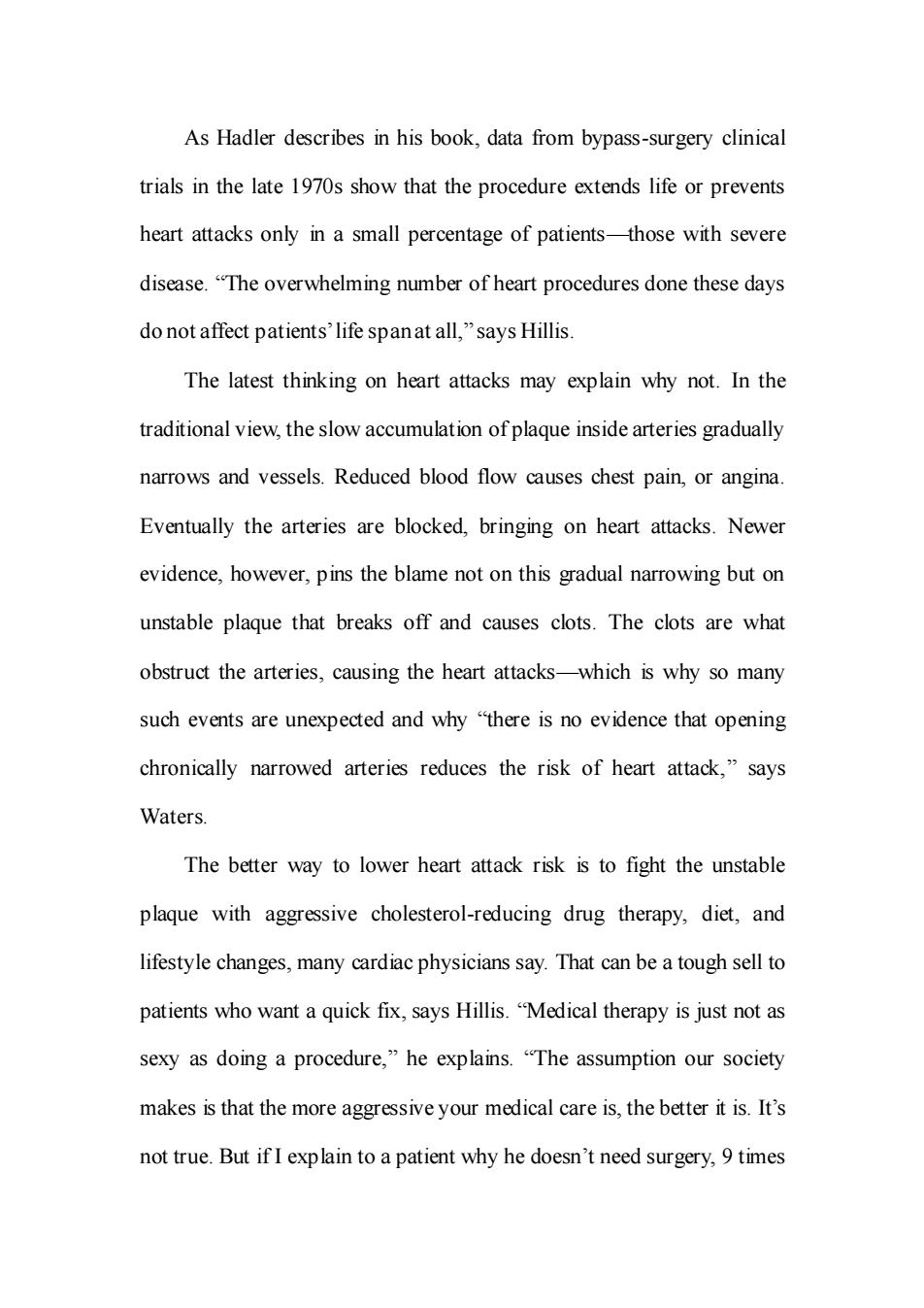
As Hadler describes in his book,data from bypass-surgery clinical trials in the late 1970s show that the procedure extends life or prevents heart attacks only in a small percentage of patients-those with severe disease."The overwhelming number of heart procedures done these days do not affect patients'life spanat all,"says Hillis. The latest thinking on heart attacks may explain why not.In the traditional view,the slow accumulation ofplaque inside arteries gradually narrows and vessels.Reduced blood flow causes chest pain,or angina. Eventually the arteries are blocked,bringing on heart attacks.Newer evidence,however,pins the blame not on this gradual narrowing but on unstable plaque that breaks off and causes clots.The clots are what obstruct the arteries,causing the heart attacks-which is why so many such events are unexpected and why "there is no evidence that opening chronically narrowed arteries reduces the risk of heart attack,"says Waters. The better way to lower heart attack risk is to fight the unstable plaque with aggressive cholesterol-reducing drug therapy,diet,and lifestyle changes,many cardiac physicians say.That can be a tough sell to patients who want a quick fix,says Hillis."Medical therapy is just not as sexy as doing a procedure,"he explains."The assumption our society makes is that the more aggressive your medical care is,the better it is.It's not true.But if I explain to a patient why he doesn't need surgery,9 times
As Hadler describes in his book, data from bypass-surgery clinical trials in the late 1970s show that the procedure extends life or prevents heart attacks only in a small percentage of patients—those with severe disease. “The overwhelming number of heart procedures done these days do not affect patients’life span at all,” says Hillis. The latest thinking on heart attacks may explain why not. In the traditional view, the slow accumulation of plaque inside arteries gradually narrows and vessels. Reduced blood flow causes chest pain, or angina. Eventually the arteries are blocked, bringing on heart attacks. Newer evidence, however, pins the blame not on this gradual narrowing but on unstable plaque that breaks off and causes clots. The clots are what obstruct the arteries, causing the heart attacks—which is why so many such events are unexpected and why “there is no evidence that opening chronically narrowed arteries reduces the risk of heart attack,” says Waters. The better way to lower heart attack risk is to fight the unstable plaque with aggressive cholesterol-reducing drug therapy, diet, and lifestyle changes, many cardiac physicians say. That can be a tough sell to patients who want a quick fix, says Hillis. “Medical therapy is just not as sexy as doing a procedure,” he explains. “The assumption our society makes is that the more aggressive your medical care is, the better it is. It’s not true. But if I explain to a patient why he doesn’t need surgery, 9 times
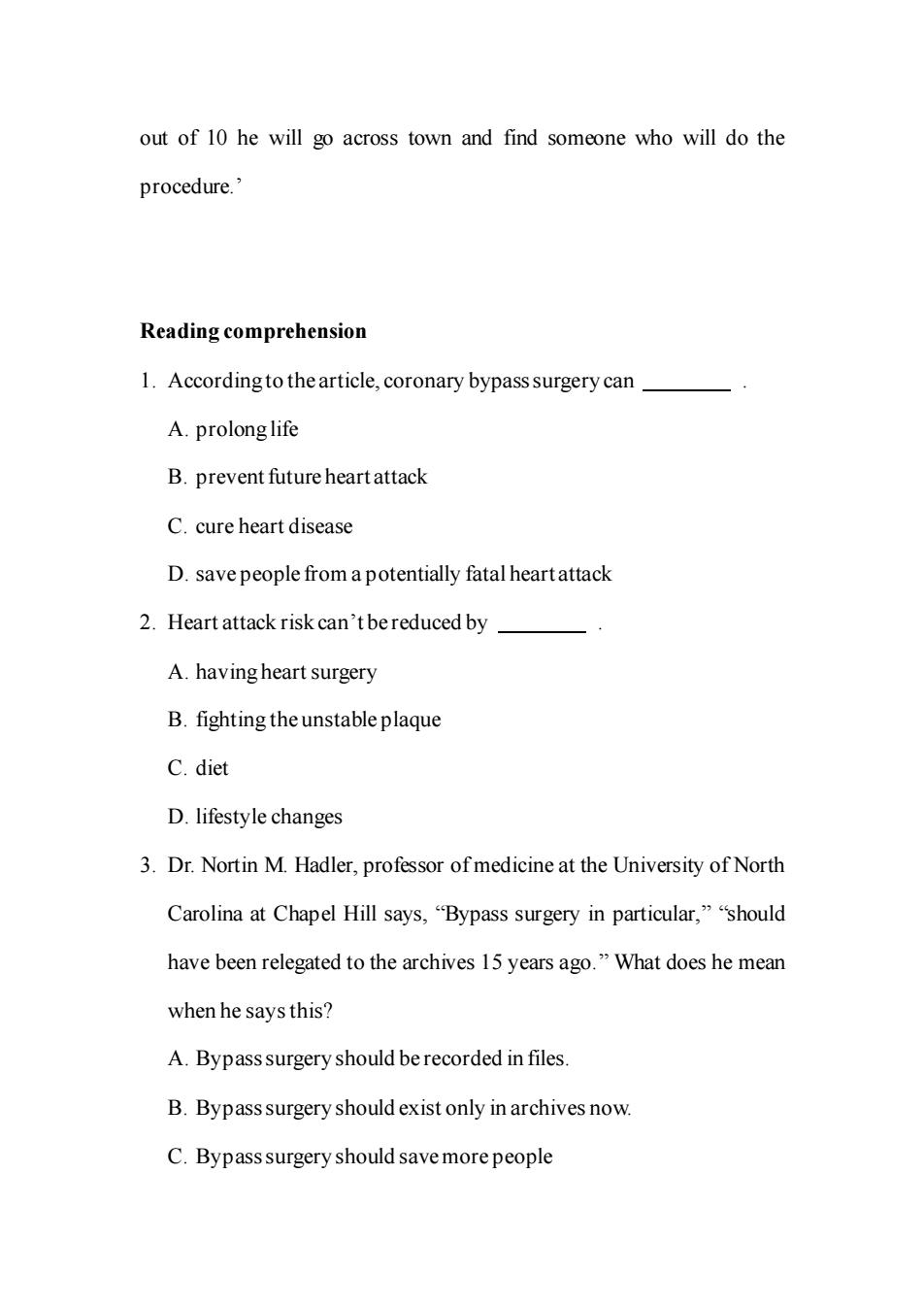
out of 10 he will go across town and find someone who will do the procedure. Reading comprehension 1.Accordingto thearticle,coronary bypass surgery can A.prolonglife B.prevent future heart attack C.cure heart disease D.save people from a potentially fatal heartattack 2.Heart attack risk can't bereduced by A.having heart surgery B.fighting the unstable plaque C.diet D.lifestyle changes 3.Dr.Nortin M.Hadler,professor ofmedicine at the University of North Carolina at Chapel Hill says,.“Bypass surgery in particular,”“should have been relegated to the archives 15 years ago."What does he mean when he says this? A.Bypasssurgery should be recorded in files. B.Bypass surgery should exist only in archives now. C.Bypasssurgery should save more people
out of 10 he will go across town and find someone who will do the procedure.’ Reading comprehension 1. According to the article, coronary bypass surgery can . A. prolong life B. preventfuture heart attack C. cure heart disease D. save people from a potentially fatal heart attack 2. Heart attack risk can’t be reduced by . A. having heart surgery B. fighting the unstable plaque C. diet D. lifestyle changes 3. Dr. Nortin M. Hadler, professor of medicine at the University of North Carolina at Chapel Hill says, “Bypass surgery in particular,” “should have been relegated to the archives 15 years ago.” What does he mean when he says this? A. Bypass surgery should be recorded in files. B. Bypass surgery should exist only in archives now. C. Bypass surgery should save more people

D.Bypasssurgery should extendpatients'lives 4.Which of the following statements is NOTtrue about heart surgery? A.It has been done many times. B.It has enormous medical and economic implications C.It can cure heart disease. D.It is being questioned by doctorsnow 5.The mainidea of this article is about A.the discussion ofdoing heart surgery B.theeffect of heart surgery C.the introduction ofheart surgery D.thecause ofheart disease
D. Bypass surgery should extend patients’lives 4. Which of the following statementsis NOT true about heart surgery? A. It has been done many times. B. It has enormous medical and economic implications. C. It can cure heart disease. D. It is being questioned by doctors now. 5. The main idea of this article is about . A. the discussion of doing heart surgery B. the effect of heart surgery C. the introduction of heart surgery D. the cause of heart disease